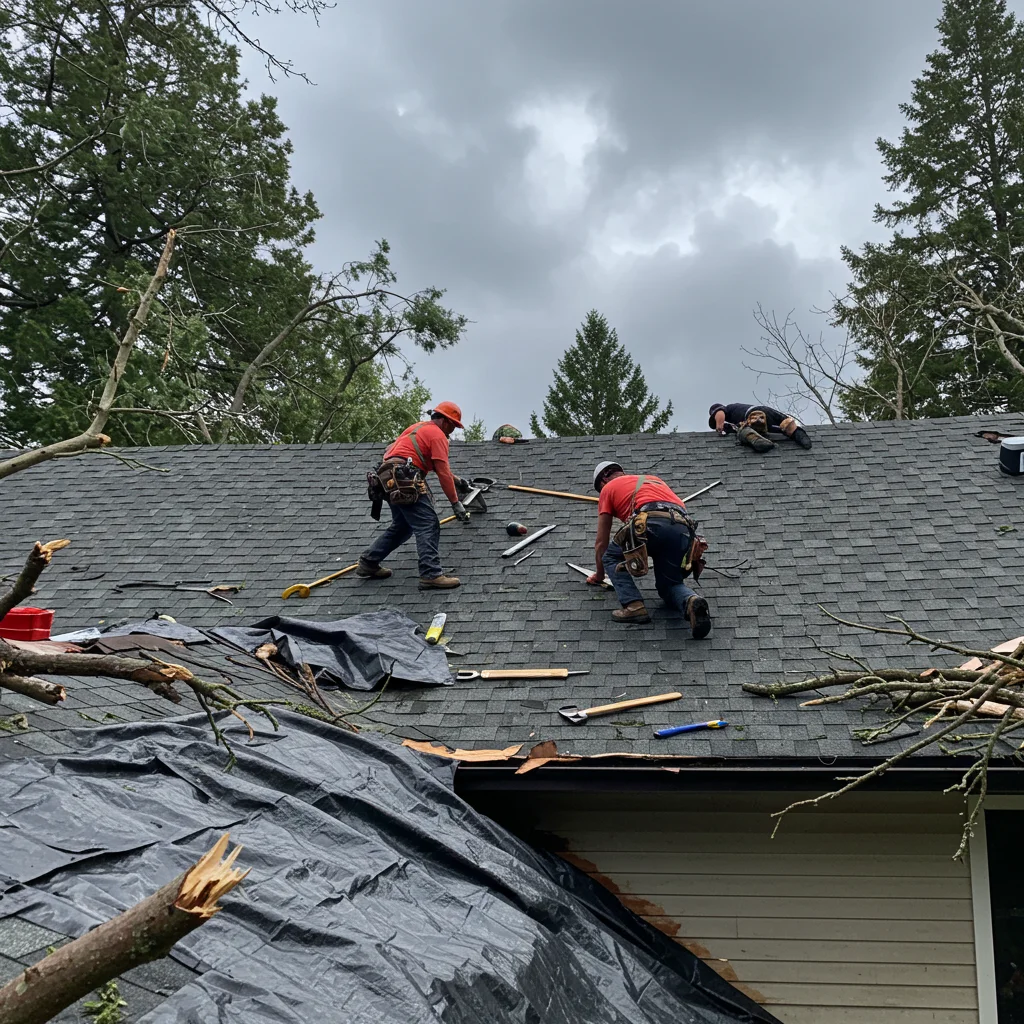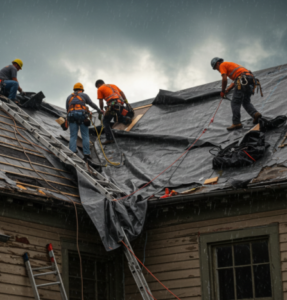Can Roofers Work in the Rain?
Everything Homeowners Need to Know About Roofing in Wet Weather

Understanding the Risks and Realities of Roofing in the Rain
Rainy weather can cause big problems for roofing projects. Wet surfaces become slippery, which increases the chance of falls and accidents. Roofing adhesives and roof sealants may not stick properly if they get wet too early, leading to leaks and water damage. Materials like untreated wood, porous underlayments, or plywood sheeting can also warp or weaken when exposed to rain. This is why most roofing contractors try to schedule jobs during dry days. Still, some emergency roofing services—like stopping a roof leak—can’t wait for the rain to stop.
What Roofers Can and Cannot Do When It’s Raining
Roofers can still work in light rain, especially for emergency roof repairs. In these cases, a temporary patch or tarp is often placed to stop further water from entering the home.
- However, some jobs must be postponed during bad weather. For example:
- Roof tear off can expose roof underlayment and plywood to water.
- Flat roofing systems using TPO membrane or PVC membrane must be dry for proper seam welding.
- Full roof replacements or composite shingle roof installations are best done in dry weather.
Roofing project delays due to weather are normal, but experienced roofing installation crews know how to manage the schedule and keep you informed.
Roofing Safety Protocols in Wet Weather
Roof safety is always important—but even more so when it’s raining. Roofers use non-slip footwear, roof harnesses, and rain-resistant gear to stay protected. They also rely on factory trained crews who understand how to reduce risks while working in wet conditions. Slippery surfaces, electrical roofing equipment, and standing water on the roof can create dangerous situations. That’s why certified workers follow strict safety protocols and are trained in low impact roof installation methods that help reduce hazards.
Contents
- Understanding the Risks and Realities of Roofing in the Rain
- What Roofers Can and Cannot Do When It’s Raining
- Roofing Safety Protocols in Wet Weather
- How Experienced Contractors Handle Roofing in the Rain
- Alternatives and Proactive Maintenance During Rainy Seasons
- Questions Homeowners Ask About Roofing in the Rain
- Roofing Done Right—Even in the Rain
- Ready to Protect Your Home? ?
How Experienced Contractors Handle Roofing in the Rain
GoodExperienced contractors have systems in place for handling unexpected weather. Here’s how they manage:
- Use of protective tarps to shield roof sections.
- Tarp protection and temporary patching for leaks.
- Smart roofing project scheduling to avoid dangerous weather.
- Use of proper roofing installation equipment and tools for wet conditions.
- Roof inspections to catch problems early.
- Roof maintenance like sealing small leaks or replacing flashing.
- Roof cleaning to remove debris that blocks water flow.
- Roof treatment for aging materials.
- Chimney repair or fixes to other rooftop components.
- Certified roofing methods
- Rain-proof scheduling
- Emergency service when it matters most
Some roofing contractors even include weather-related clauses in contracts so homeowners know what to expect during rain delays. The best companies offer transparent pricing, honest communication, and a backup plan.
Alternatives and Proactive Maintenance During Rainy Seasons
If your roof can’t be worked on right away, don’t wait. Instead, ask your roofer about other services, such as:
These services help keep your roofing materials in good shape and protect against mold growth, fungal growth, and structural damage.
Questions Homeowners Ask About Roofing in the Rain
Can roofers work in heavy rain?
No. Heavy rain often causes delays due to safety issues and poor working conditions.Is light rain okay?
Yes, if the job is minor and the team is trained. They’ll use waterproof coverings and protective gear.Will my roof materials get damaged by rain?
Yes, if not protected. Plywood sheeting, adhesives, and underlayments are at risk. Good contractors protect them with roofing tarps.Should I try DIY roof repair in the rain?
No. It’s not safe. Roofing work requires training and safety equipment.What happens if my project is delayed?
Your roofer may pause the job and return when the weather clears. Delays can affect labor hours or equipment rental costs—check your roofing contract for details.Roofing Done Right—Even in the Rain
Roofing companies with full-time employees, roof installation crews, and proper resources are ready for any weather. From residential roofing to commercial roofing, experienced contractors can keep your roof protected with:
Whether you're working on a cedar conversion roof, getting a roof estimate, or replacing old shingles, don’t let rain stop you from acting.
Ready to Protect Your Home?
Rain doesn’t have to mean roofing stops. The key is hiring the right team. Look for roofers with roofing certifications, who offer roof estimate requests, and who use quality roofing products. With help from professionals, your roof replacement, roof repairs, or roof maintenance can be done safely and efficiently—rain or shine. Get a quote today and protect your home with confidence. Whether it’s a light drizzle or a downpour, expert roofing services are just a call away.

Can Roofers Work in the Rain?
Premium Roofing Solutions Blog Can Roofers Work in the Rain? Everything Homeowners Need to Know About Roofing in Wet Weather Understanding the Risks and Realities
